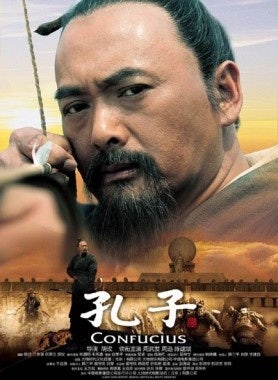Release Of Big-Budget Biopic Aimed At Increasing Domestic Appreciation Of Philosopher As Well As International Soft Power. But Will It Work?#

On January 22, the biopic "Confucius," one of the most expensive Chinese movies of all time, will be released in nearly 2,500 cinemas throughout China -- roughly 1,000 more than last year's historical blockbuster The Founding of a Republic. Confucius, a $22 million production starring Hong Kong action star Chow Yun-Fat as the titular philosopher, is the latest attempt to cash in on the Chinese public's growing interest in Confucianism, one that is being actively promoted by the Chinese government -- despite the CCP's very public denunciation of the ethos during the first thirty years of the People's Republic.
Although Confucius, and more rigorous study of Confucius' analects in the Chinese educational system, is aimed at a domestic audience, the re-emergence of the ancient sage over the past several years indicates that he may be the greatest force for Chinese soft power on the world stage. Indeed, China's answer to European cultural institutes like France's Alliance Francaise and Germany's Goethe-Institut, the Confucius Institute, promotes not only the Chinese language but also Chinese culture. As a recent article on the spread of Confucius Institutes suggested,
[Confucius Institutes] are primarily intended to showcase Chinese language and culture. China used the Confucius brand just as Germany and Spain use Goethe and Cervantes to brand their overseas institutes, which perform much the same role.
The creation of the institutes partly reflects China’s desire to be accepted and respected by the rest of the world, but it is also highly practical. There has been steeply rising demand for Chinese language teaching and China wants to supply it. Moreover, the Institutes are usually embedded within universities overseas, which absorb some costs and stimulate other academic linkages, such as exchange programmes for students and teachers, and joint research. This is an area where China may well come to exercise the real power of knowledge – part of the ‘soft power’ China is strategically exerting around the world.
Publicly endorsing Confucius and Confucianism effectively serves a double purpose for the Chinese government. Overseas, Beijing is likely eager to promote Confucius as the "face" of China because of the existing familiarity many outside of China have with him and (at least some of) his writings, and because Confucius doesn't often provoke the same strong emotional reactions among non-Chinese audiences as some Chinese figures in the country's recent history.
Within China, the Confucian concept of social organization melds well with the government's current emphasis on building a "harmonious society," and offers some philosophical solid ground to many of China's urban dwellers who -- having already achieved some measure of material satisfaction -- now want to find their place in society. As a recent China Daily article noted, an instrumental factor in the rising popularity of Confucius study in China is a sense that Chinese culture both traditional and modern have been placed on the back burner as a result of the country's rapid industrialization, and that Chinese culture itself now plays second fiddle to Western culture among most of China's younger population. From the piece:
China has followed the West selectively since the May 4th Movement in 1919. Since Chinese misread that Western civilization was only about skyscrapers and cars, they embraced industrialization wholeheartedly and missed out on Western music, literature and arts, sports, philosophy, religion and law.
We don't have to lament this if we learn a lesson from history. "This is the time for double enlightenment," [Kung Peng-cheng, a Taiwan resident and visiting professor at Peking University] says. "We should not just study Chinese culture, but also see Western culture in a new light." Only by doing so can we know the advantages and disadvantages of Western culture, and avoid evaluating our own traditions wrongly.
It remains to be seen whether Confucian thought can appeal to a significant number of people outside of China -- or even within the increasingly consumer-driven country. Promoting the philosopher has always run up against obstacles overseas, mainly because Confucian thought is considered old-fashioned and anachronistic by some, misogynistic and paternalistic by others, and has been misrepresented in many cases to a reductive, "fortune cookie"-ish series of soundbites. At home, many younger Chinese are more interested in pop culture than ancient philosophy, although the aforementioned thirty-something urbanites might be the primary audience. However, it is always difficult to predict cultural crazes, and Confucius -- the philosopher and the movie -- could attract more fans both at home and abroad than some people expect.
